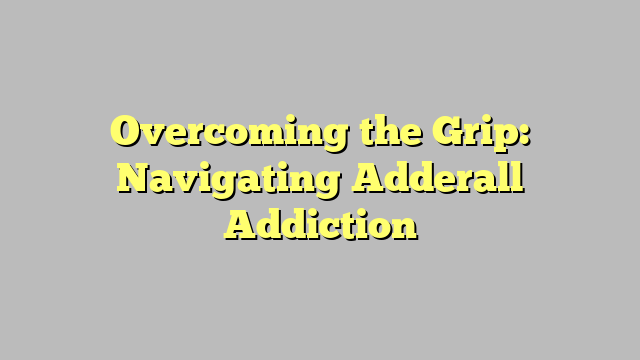
Overcoming the Grip: Navigating Adderall Addiction
Adderall addiction is a growing concern in today’s society, affecting individuals of all ages and backgrounds. This prescription stimulant, commonly used to treat attention deficit hyperactivity disorder (ADHD), has also gained popularity as a study aid and performance enhancer. However, the misuse and abuse of Adderall can lead to serious consequences, including addiction.
The grip of Adderall addiction can be pervasive, with individuals finding themselves dependent on the drug for various reasons. As the number of prescriptions for Adderall continues to rise, so does the potential for misuse and addiction. Recognizing the signs of Adderall addiction and understanding the challenges of overcoming it are crucial steps in navigating this complex issue.
Recognizing the Signs
Recognizing the signs of adderall addiction is crucial for early intervention. Some common signs include increased tolerance, where individuals need higher doses to achieve the same effects. With prolonged use, one may also experience withdrawal symptoms such as fatigue, depression, and irritability. Changes in behavior, such as social withdrawal or secretive behavior, may also indicate a developing addiction.
Physical signs of adderall addiction can manifest as changes in appearance and hygiene. Weight loss, insomnia, and dilated pupils are physical manifestations of prolonged stimulant use. Additionally, irregular heartbeat and high blood pressure are potential health indicators of adderall abuse. These physical signs should not be ignored and may warrant seeking professional help.
Adderall Addiction
In some cases, the psychological signs of adderall addiction can be subtle but impactful. This may include increased anxiety, paranoia, or even hallucinations. Individuals may also exhibit a preoccupation with obtaining and using adderall, leading to neglect of responsibilities and hobbies. Recognizing these psychological signs is essential in understanding the full extent of adderall addiction and its impact on an individual’s life.
Seeking Help
When dealing with adderall addiction, remember that seeking help is a crucial step towards recovery. It’s important to reach out to professionals who specialize in addiction treatment. They can provide guidance and support tailored to your specific needs and circumstances.
In addition to seeking professional help, consider joining a support group for individuals struggling with adderall addiction. Connecting with others who are going through similar experiences can offer a sense of community and understanding. These groups can provide a safe space to share your struggles and receive encouragement from those who truly understand what you’re going through.
Finally, prioritize self-care as you seek help for adderall addiction. Take time to engage in activities that promote your overall well-being, such as exercise, meditation, or spending time with loved ones. Remember that you are not alone in this journey, and there are resources available to support you every step of the way.
Recovery Roadmap
It’s important to start your journey to recovery by seeking help from a healthcare professional specialized in addiction treatment. They can provide guidance on the best approach to taper off Adderall safely while managing any withdrawal symptoms that may arise.
In addition to professional help, building a strong support system of family and friends can make a significant difference in your recovery process. Surround yourself with individuals who understand your struggles and are there to offer encouragement and accountability along the way.
Lastly, focus on adopting healthy lifestyle habits that can support your recovery from Adderall addiction. This includes regular exercise, nutritious diet, mindfulness practices, and engaging in activities that bring you joy and fulfillment. Remember, recovery is a journey, and taking small steps each day can lead to lasting positive change.



